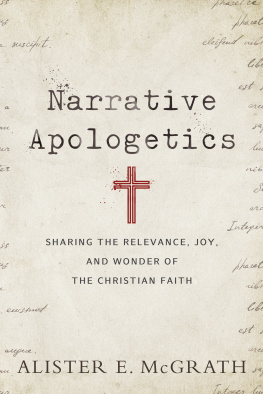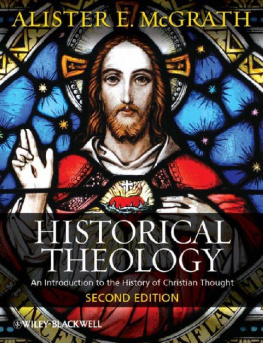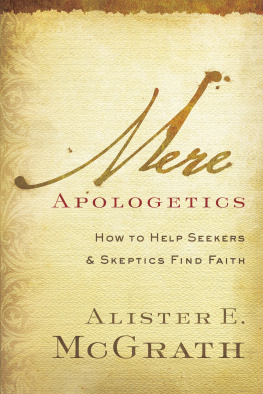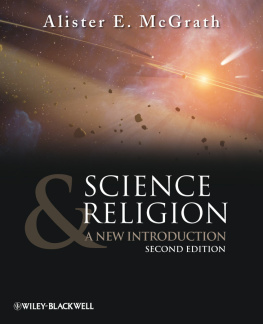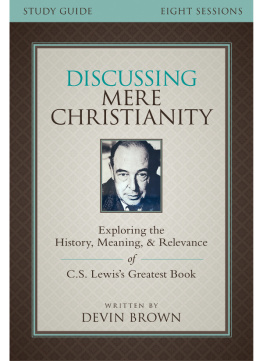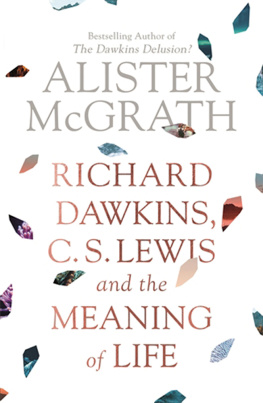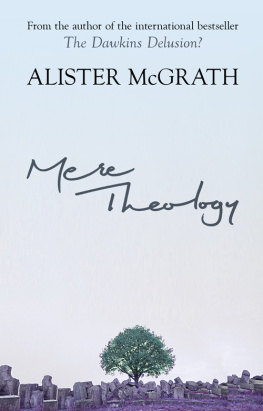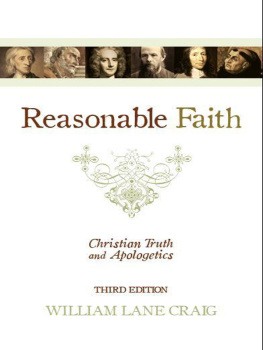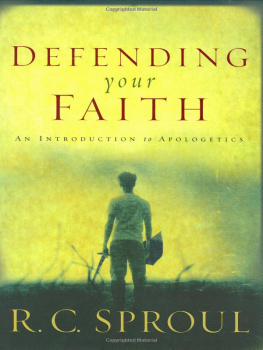Alister E. McGrath - Intellectuals Dont Need God and Other Modern Myths: Building Bridges to Faith Through Apologetics
Here you can read online Alister E. McGrath - Intellectuals Dont Need God and Other Modern Myths: Building Bridges to Faith Through Apologetics full text of the book (entire story) in english for free. Download pdf and epub, get meaning, cover and reviews about this ebook. year: 2010, publisher: Zondervan, genre: Religion. Description of the work, (preface) as well as reviews are available. Best literature library LitArk.com created for fans of good reading and offers a wide selection of genres:
Romance novel
Science fiction
Adventure
Detective
Science
History
Home and family
Prose
Art
Politics
Computer
Non-fiction
Religion
Business
Children
Humor
Choose a favorite category and find really read worthwhile books. Enjoy immersion in the world of imagination, feel the emotions of the characters or learn something new for yourself, make an fascinating discovery.

- Book:Intellectuals Dont Need God and Other Modern Myths: Building Bridges to Faith Through Apologetics
- Author:
- Publisher:Zondervan
- Genre:
- Year:2010
- Rating:3 / 5
- Favourites:Add to favourites
- Your mark:
- 60
- 1
- 2
- 3
- 4
- 5
Intellectuals Dont Need God and Other Modern Myths: Building Bridges to Faith Through Apologetics: summary, description and annotation
We offer to read an annotation, description, summary or preface (depends on what the author of the book "Intellectuals Dont Need God and Other Modern Myths: Building Bridges to Faith Through Apologetics" wrote himself). If you haven't found the necessary information about the book — write in the comments, we will try to find it.
Alister E. McGrath: author's other books
Who wrote Intellectuals Dont Need God and Other Modern Myths: Building Bridges to Faith Through Apologetics? Find out the surname, the name of the author of the book and a list of all author's works by series.
Intellectuals Dont Need God and Other Modern Myths: Building Bridges to Faith Through Apologetics — read online for free the complete book (whole text) full work
Below is the text of the book, divided by pages. System saving the place of the last page read, allows you to conveniently read the book "Intellectuals Dont Need God and Other Modern Myths: Building Bridges to Faith Through Apologetics" online for free, without having to search again every time where you left off. Put a bookmark, and you can go to the page where you finished reading at any time.
Font size:
Interval:
Bookmark:

Like every significant discipline, apologetics has a long and respectable pedigree. Christians have been defending their faith against all sorts of criticisms and misunderstandings ever since the New Testament period. But the situations that writers such as Athenagoras and Justin Martyr addressed are usually of relatively little apologetic relevance today (whatever their attractions may be to historians of thought). Second-century Alexandria, thirteenth-century Paris, and seventeenth-century Cambridgeto note some outstanding periods in the history of Christian apologeticslie firmly in the past. Their situations do not necessarily bear much relation to our own. Textbooks on Christian apologetics often indulge in extensive historical analysis simply because this is expected. But experience suggests that all too often the historical section is simply skipped over: Who cares what Justin Martyr had to say when this is of purely antiquarian interest? It is the situation of today that demands attention!
For the situation has indeed changed. The debate has shifted radically away from the universities and from the academic approaches to apologetics. It is in the marketplace of ideas, not the seminar rooms of universities, that Christianity must fight for its life. The television studio, the national press, the university cafeteria, and the local shopping mall are the new arenas in which the truth claims of Christianity are tried and tested. Christianity must commend itself in terms of its relevance to life, not just its inherent rationality.
Today we must realize that apologetics is more than a commendation of the cerebral attractions of Christianity. Classical apologetics has tended to treat Christianity simply as a set of ideas, meeting a series of intellectual barriers that can be neutralized, or perhaps even overcome, by judiciously deployed arguments. It has focused its sights firmly on the great intellectual riddles which each and every age has regarded as posing obstacles to faith in Godsuch as the enigma of human suffering, or the difficulties encountered in proving that God really exists. By refining its arguments and deploying ever more sophisticated distinctions and subtleties, apologetics has sought to ensure that the Christian voice remains heard in an increasingly secular intellectual world.
Traditional apologetics has served the church well through the ages and will continue to do so in the future. But too often, traditional apologetics has sought to commend Christianity without asking why it is that so many people are not Christians. It seems relatively pointless to extol the attractiveness of the Christian faith if this is not accompanied by a deadly serious effort to discover why it is so obviously unattractive to so many people. There is a reluctance to listen to those outside the community of faith to learn why they are outside that community. Those who have yet to discover Christianity and those who have rejected it, whether unconsciously or deliberately, often do so for reasons that totally escape the dragnet of traditional apologetics.
What sort of reasons? History often conspires against Christianity by pointing to unacceptable past associations between the Christian church and political or social oppression. Culture often brings its weight to bear against the gospel by implying that it is not acceptable to be a Christian, since to be a Christian often means adopting a set of values that run counter to those of the prevailing culture. As a result, Christians are cast in the role of cultural outsiders.
At one level, these sorts of pressures are not intellectual in nature. They are not arguments, in the sense of a rationally justified case against the Christian faith. But such pressures and many others undoubtedly exist. They affect people. They shape their attitudes toward faith, prejudicing them against it. They are part of a wider matrix of arguments, attitudes, and values that collectively build up to provide a cumulative climate that is hostile to faith. To exclude them from reference or consideration results in a truncated apologetics, incapable of meeting the full seriousness of the contemporary challenge to faith. Yet that challenge must be met in all its fullness. A challenge demands an apologia.
Traditional apologetics, which was conceived as a science, with timeless questions and timeless answers, seems to have become stranded in a backwater, bypassed by the real debate and ignored by the opinion-makers. It often seems sadly irrelevant to the real debates and arguments of the modern age. It has become marginalized in the great debate within modern society, precisely because it makes its appeal to an increasingly marginalized element inside this societythe academically minded. The cutting edge of faith now lies elsewherewith the preacher whose sermons aim to reassure the committed and challenge the outsider, the business executive who shares his faith with his colleagues at work, or the student who explains her faith on campus. Apologetics needs to be revitalizedcreatively and effectively. A new situation means that a traditional resource needs to be adapted to its needs and opportunities. The science of apologetics needs to be complemented by the art of apologetics.
This book does not seek to discard or discredit traditional approaches to apologeticsit seeks to supplement them. It aims to make available different ways of thinking about and doing apologeticsways that complement the more traditional approaches. This book is not especially academic in tone, although it rests on rigorously academic foundations. It is not committed to a single theory of apologetics, nor to a single approach, nor to the writings of a single outstanding apologist. Rather, it tries to bring the resources of the Christian apologetic tradition and of Christian theology to bear on the people and the situations of greatest relevance within modern society.
Above all, this book seeks to stimulate its readers to explore and develop approaches to the defense of the gospel that are appropriate to their own special needs and opportunities. While recognizing the strengths of the science of issue-based apologetics, it commends the art of a people-based approach. Responsible apologetics is based on a knowledge of both the gospel and its audience. People have different reasons for not being Christians. They offer different points of contact for the gospel. An apologetics that is insensitive to human individuality and the variety of situations in which people find themselves is going to get nowherefast.
The apologist must make the connections with the lives of real people in the modern world. Without those connections, theories remain theoriesabstract ideas hang in mid-air rather than being grounded in the realities of life. But the history of Christian apologetics demonstrates that these connections can be made, just as the history of the church shows that they must be made.
The effective apologist is one who listens before speaking and who makes every effort to link the resources of the Christian apologetic tradition both to the needs of that person and to the level of that persons ability to handle argumentation and imagery. The art of effective apologetics is hard work. It simultaneously demands a mastery of the Christian tradition, an ability to listen sympathetically, and a willingness to take the trouble to express ideas at such a level and in such a form that the audience can understand them and respond to them.
Font size:
Interval:
Bookmark:
Similar books «Intellectuals Dont Need God and Other Modern Myths: Building Bridges to Faith Through Apologetics»
Look at similar books to Intellectuals Dont Need God and Other Modern Myths: Building Bridges to Faith Through Apologetics. We have selected literature similar in name and meaning in the hope of providing readers with more options to find new, interesting, not yet read works.
Discussion, reviews of the book Intellectuals Dont Need God and Other Modern Myths: Building Bridges to Faith Through Apologetics and just readers' own opinions. Leave your comments, write what you think about the work, its meaning or the main characters. Specify what exactly you liked and what you didn't like, and why you think so.

